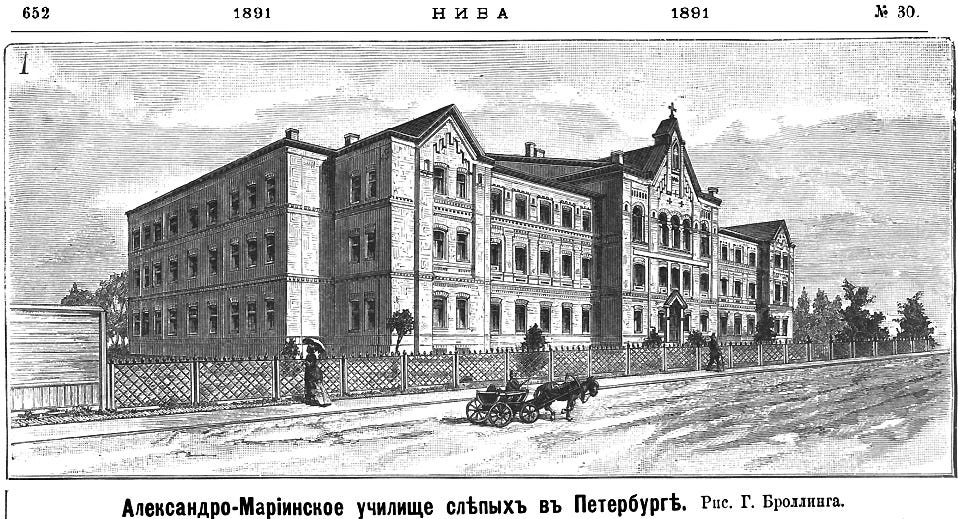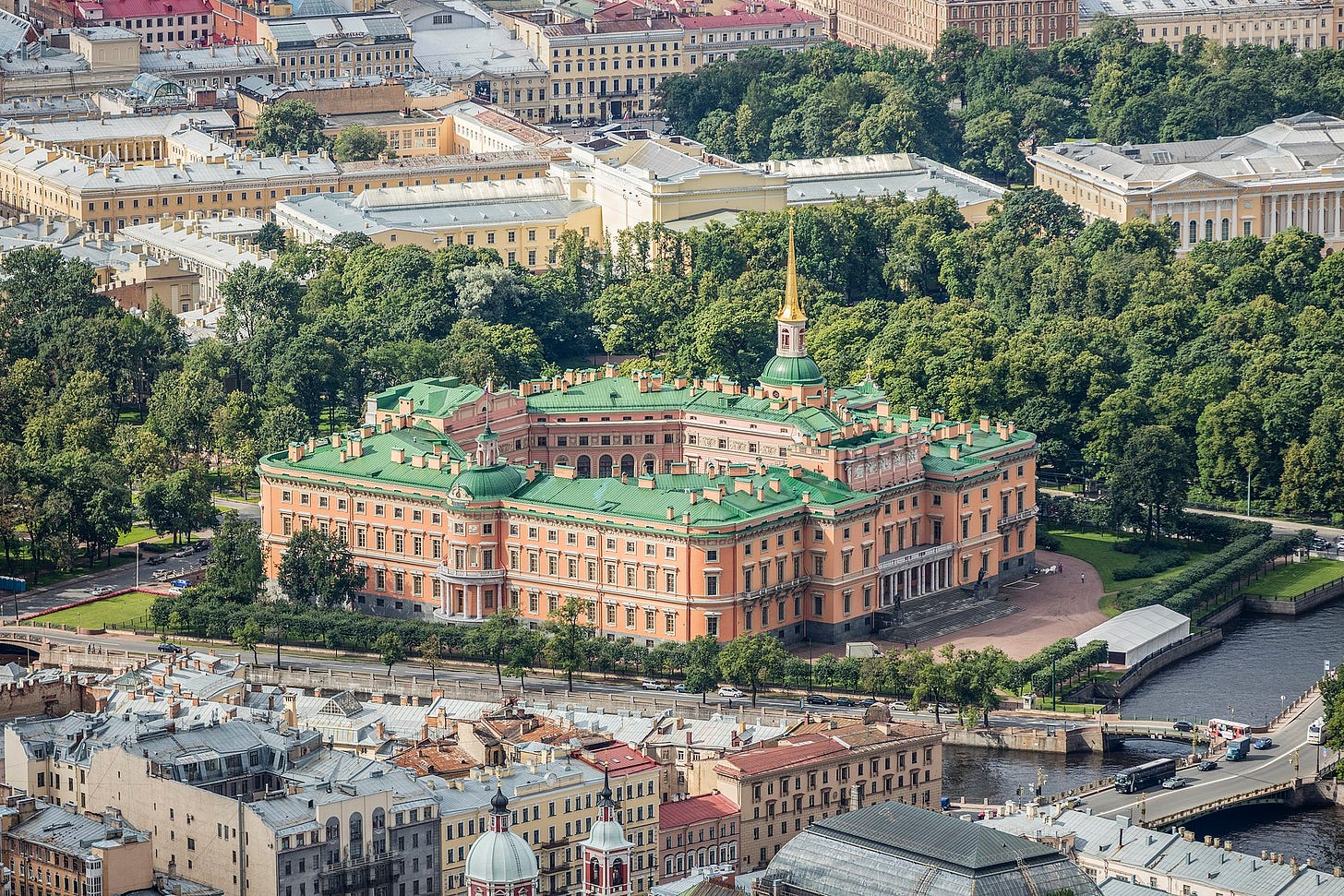29 January 1880. Tuesday
In the morning, D. D. [Dmitry Dmitrievich] declared: “If I devote myself to the service of the Mission, what then have I to say of salary?” (This, after reading the letter of His Grace Nestor, concerning the sweetness and bitterness of such service). We shall see, in practice, whether it shall be so.
A third-year student of the Medical Academy, Vladimir Apollonovich Giltebrandt, visited and remained until one o’clock.—A bullet—from a tree whilst hunting,—“I told you—you would not hit.”
Darwinism (in the sense of poetic fancy at the meeting of the Society of Naturalists), that a child lives through all epochs of mankind, beginning from the animal. Coarseness and grimaces...

At two o’clock, I was at the “School for Blind Warriors,” on Petersburg Street, in the Great Belozerskaya; eight blind men were present; their guide, himself half-blind and only recently married. Without him, the blind would wander into the street and under the horses on their way to church: “Where then are our blind?”—four lay scattered about.
The basket-weaving instructor—a robust German, Karl Petrovich. He is training here for the institution in Kiev.
Avdotya Dmitrievna Kovanko and—“what of it, a woman!”
A donation of two baskets and an offering of fifteen kopecks each; a dark-browed Cossack woman, wife of one of the blind, serves as cook.—I recounted tales of the blind in Japan.—“Eyes ever moist.”
At four o’clock, to Tsivilkov,—a hundred hyacinths, tulips, and others.
By five o’clock, at Nikolai Petrovich Semenov’s. He had but just come from the bath. His eldest son was at his singing lesson. Dinner. Strakhov. Of Danilevsky and the reading of his illegible letter concerning Darwin. A tale of Kossovich.—“A great scholar—a child in worldly matters”—how Kossovich was deceived and prematurely aged by Golovin (the matter of the ‘printing house’). Ramchender—an Indian prince, nephew of “Nana Sahib.” Articles and translations by Semenov.
Returned home at the second hour past midnight.
30 January 1880. Wednesday
In the morning, I attended upon the Governor, at his summons the previous evening at ten o’clock; concerning the Bishop’s anxieties regarding the Mission’s affairs, the Ober-Procurator, and Abaza; I offered an explanation of the true course of events. The Governor advised that the Bishop be reassured with this account. With the latter was Father Isaiah from the Novgorod Yuriev Monastery.—A brief explanation. The Bishop on Nikonov—“he does not love monks,” on Melnikov—“a good man.”
To P. A. [Petr Andreevich] Giltebrandt. His wife, Maria Maksimovna, was anxious and showing some signs of a developing fever.—At Fyodor Nikolaevich’s, letters from Japan, among them one to Maria Alexandrovna, another from Anna of the girls’ school, and one from Roman concerning the tuning fork. Fyodor Nikolaevich read what I had brought the previous evening.
Around two o’clock, at Dr. Pyasetsky’s. Ramchender presented all with much ceremony—a certain colonel, midshipman Arsenyev (who already had a letter prepared for me from Sverbeyeva), and the Japanese Yamamoto (military agent). We examined Chinese watercolors and silhouettes; Arsenyev showed me a panorama of his travels.
Pyasetsky was most amiable (Fyodor Nikolaevich—alone). It would indeed be a pity if his collection were to go abroad. It is worth ten thousand. His panorama is a unique creation. With it, none need travel that path again. And what labor! It is scarcely believable that one man, during his journey, could have painted such an inimitably splendid panorama and so many excellent pictures.

To Ivan Ivanovich Demkin.
To Pavel Alexandrovich Kuznetsov, a peasant, about crosses and stamps.
To an Unction service. A beautiful and tranquil setting around a seventy-five-year-old woman. Seven vessels and seven candles, oil, and wine,—the Gospel held overhead, abbreviated prayers, the cantors in haste, farewells following the anointing, after a brief homily by Father Ioann.
Father Feodor; a dispute, and Ivan Ivanovich, cornered in the debate—smiling and waving his hand. The evening was spent among the three of us.

Returned, together with Father Feodor, as far as the Mikhailovsky Castle.
I found my way home at the second hour.
31 January 1880. Thursday
In the morning, a donation was brought from the Church of St. Catherine on Vasilyevsky Island, where I had called three days prior and, at the gates, suffered a fall that left my knee injured.
D. D. [Dmitry Dmitrievich] arrived, followed by Ivan Ivanovich Demkin, who unsettled us with his remark that “Dmitry Dmitrievich must finish his course.”*
Father Makary, the Orlov Archimandrite, now serving in turn—having entered monastic life three months ago from among the widowed archpriests.
The Society for the Dissemination of the Holy Scriptures was much praised—a hymn of commendation—though there is something Protestant in its manner (prayer offered by laymen, extemporaneously, in the presence of priests but without blessing).
A mission to India is proposed with Father Makary, his “matushka” and children.
Meanwhile, the packers, who had arrived earlier, were sealing forty-two large and six small icons, donated by His Grace Isidore, as well as books from Father Mitrofan. In all, there were five crates, intended for dispatch by ships of the Volunteer Fleet, in accordance with the proposal of Konstantin Petrovich Pobedonostsev.
D. D. took the vestments to the Novodevichy Convent for burning or repair. The disquiet introduced by Ivan Ivanovich he carried away with him.
I, too, was somewhat out of sorts, and thus gave a rather inhospitable explanation to a lady seeking a visiting archimandrite or bishop—who proved to be a neighbor of Father Arkady, newly arrived from Vitebsk.
Later, another lady came—a Ryazan native—bringing a donation of fifty rubles (Lyubavskaya)—and with what simplicity, what Orthodox spirit!
In the evening, a note arrived from T. I. [Tertiy Ivanovich] Filippov, announcing that “the matter at the State Council ended favorably.” Giving the still-working packers money for tea, I went to His Grace, to gladden him with Tertiy Ivanovich’s message and to show him the plan of the Byzantine-style church drawn by Dmitry Alexandrovich Rezanov. His Grace was with His Eminence Pallady of Ryazan; I waited for an hour, reading The Voice and some of The Pilgrim, and finally departed, intending to return early tomorrow.
I went to the banya, to cure the throat ailment I contracted yesterday (my eighth illness in Petersburg). I bathed alone, for the Governor was expected.
This evening at half past eight I was meant to go to Mitusov’s, but yesterday he informed me that, due to a fall from his carriage and his illness, he was postponing the dinner. And well it was that he did postpone it, for otherwise the packing of the five crates would not have been finished.
Translation Notes
Seven vessels and seven candles: "стручки" is rendered as "vessels" to reflect Orthodox liturgical practice; "pods" is not used in English for this context.
Cantors: "причетники" is translated as "cantors," which is accurate for lay assistants in Russian Orthodox services; "deacons" would be incorrect.
Anointing of the Sick: Used instead of "Unction service" for clarity and accuracy.
“чередной,— три месяца тому назад поступивший в монашество из вдовых протоиереев”
Rendered as “now serving in turn—having entered monastic life three months ago from among the widowed archpriests.” The phrase “чередной” refers to a cleric serving his appointed term; “widowed archpriests” is a standard ecclesiastical category.“Общество распространения книг Священного Писания; хвалебный гимн ему,— но нечто и протестантское в нем”
The description of the Society for the Dissemination of the Holy Scriptures is translated to capture the note of both praise and subtle criticism for its Protestant-style practices.“укупорщики упаковывали сорок два больших и шесть малых икон”
“Packers were sealing forty-two large and six small icons”—“укупорщики” are those who crate or pack for shipping.“на выжигу или поправку”
“For burning or repair”—refers to the practice of burning worn-out vestments or repairing them if possible.“дело в Государственном Совете кончилось благополучно”
“The matter at the State Council ended favorably”—a formal phrase indicating a positive resolution.
Text note
I tried to find out what this passage meant:
D. D. [Dmitry Dmitrievich] arrived, followed by Ivan Ivanovich Demkin, who unsettled us with his remark that “Dmitry Dmitrievich must finish his course.”
Alas, whatever the greater context was, that unsettled all of those present, is lost. The analysis is below.
Ivan Ivanovich Demkin’s Comment: Context and Analysis
The Comment in Question
On 31 January 1880, Ivan Ivanovich Demkin unsettled St. Nicholas and others with the words:
“что нужно кончить курс Дмитрию Дмитриевичу”
(“that Dmitry Dmitrievich must finish his course”)
Clues from the Immediate Entry
The comment is described as having “unsettled” (“смутил”) both St. Nicholas and Dmitry Dmitrievich.
The context is a morning visit, following a donation from the Church of St. Catherine.
There is no immediate elaboration in the entry itself as to why this remark caused such disturbance.
Searching for Context in Previous Entries (Volume 1)
Ivan Ivanovich Demkin’s Role
Ivan Ivanovich Demkin appears sporadically in earlier entries, usually in connection with the Mission’s work and as a visitor or participant in discussions.
He is not a major recurring figure in the diary up to this point, and there is no evidence of significant conflict or tension involving him in previous entries.
Dmitry Dmitrievich
Dmitry Dmitrievich is likely a seminarian or someone in training for ecclesiastical or missionary work. There are previous references to his studies and progress.
The phrase “must finish his course” could refer to the completion of theological or seminary studies, or perhaps a probationary period for work or travel.
Possible Reasons for Disquiet
The comment may have touched on anxieties regarding Dmitry Dmitrievich’s readiness or suitability for his role. It could imply doubts about his commitment, ability, or future with the Mission.
The abruptness or public nature of the remark may have embarrassed Dmitry Dmitrievich or called attention to an unresolved issue.
St. Nicholas himself notes being “somewhat out of sorts” that day, which may have heightened sensitivity to criticism or negative remarks.
Cross-Referencing Later Entries and the Index
There is no indication in later entries of a major scandal or event involving Ivan Ivanovich or Dmitry Dmitrievich immediately following this incident.
The Index of Names in the Diaries does not provide additional biographical context that would clarify a deeper conflict or ongoing issue between these individuals.
Interpretation
The most plausible explanation is that Ivan Ivanovich’s comment, though perhaps intended as a practical or even encouraging remark, was received as a pointed reminder of unfinished obligations or doubts about Dmitry Dmitrievich’s progress.
The “disturbance” may reflect underlying anxieties within the Mission about personnel, standards, or the pressure to demonstrate competence and readiness, especially in the presence of respected colleagues.
Housekeeping:
Sorry for the delay on this, it’s been a difficult few weeks here. Pray for us.






